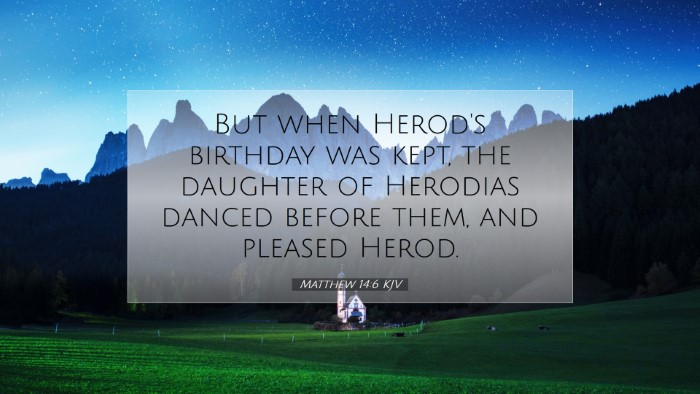Commentary on Matthew 14:6
Verse Context: Matthew 14:6 presents a pivotal moment in the life of John the Baptist, highlighting themes of moral integrity, the consequences of pride, and the intersection of secular power with spiritual truth. This moment foreshadows John the Baptist's martyrdom and reflects the tensions between the prophetic voice and worldly authority.
Analysis and Insights
Background of the Verse
In this chapter, we witness the culmination of a series of events leading to the beheading of John the Baptist. After Jesus performed miraculous works and the crowd celebrated, Herodias sought vengeance against John for his critical comments regarding her marriage to Herod Antipas. The setting of a royal feast becomes a backdrop for moral decay and manipulation.
Commentary from Matthew Henry
Matthew Henry remarks that the opulence of Herod's feast highlights the extravagance and moral corruption of the ruling class. He points out how the ruler's excesses can mask deep-seated anxieties and fears, culminating in tragic decisions. Henry emphasizes that Herod, despite being troubled by John’s preaching, ultimately succumbed to the pressure of his own dubious court and the vengeful desires of Herodias.
- Moral Implications: Henry stresses that this story serves as a cautionary tale regarding the cost of indulging one's pride and passions, highlighting that Herod's inability to stand against evil leads to tragic consequences.
- Symbolism of the Dance: The dance of Salome is seen as a metaphor for seduction and manipulation, representing the allure of worldly pleasures that can lead one away from righteousness.
Insights from Albert Barnes
Albert Barnes provides a reflective analysis on Herod's character, asserting that he was aware of John’s righteousness yet lacked the resolve to act upon it. Barnes highlights Herod's fear of spiritual truth as he danced on the precipice of moral failure.
- Herod's Conscience: Barnes notes that Herod’s attention to his conscience signifies a struggle that many face—recognizing truth yet refusing to abide by it.
- Public Perception: The dialogue surrounding Herod's decisions underscores the theme of living for public approval, shedding light on how often individuals prioritize societal expectations over moral obligation.
Reflections from Adam Clarke
Adam Clarke delves into the political intricacies at play during this event, emphasizing how Herod's actions reflect a ruler torn between desire and duty. His commentary suggests that the feigned joy at the feast was overshadowed by the dark realities of his heart.
- Pride of Position: Clarke argues that Herod's high status paradoxically leads to a lower ethical standard, as he prioritizes his reputation over justice.
- Pleasure vs. Principle: The contrast between worldly pleasure and spiritual principle invites reflection on the choices leaders must make and the costs associated with their decisions.
Theological Implications
Prophetic Witness
This narrative serves as a stark reminder of the risks inherent in being a prophetic voice in a corrupt society. John's imprisonment and subsequent execution manifest the real and often dangerous fallout of speaking truth to power.
Moral Integrity
The insistence on moral integrity, as exemplified by John the Baptist, provides a deep well of theological reflection for clergy and scholars. It encourages an exploration of how believers today can remain faithful witnesses amid societal pressures and moral pitfalls.
Challenge of Leadership
This passage raises critical questions for leaders—both secular and sacred—regarding their responsibilities and the potential consequences of their actions. The call for integrity, righteousness, and a commitment to truth stands as a guiding principle amidst moral ambiguity.
Conclusion
Matthew 14:6 encapsulates profound truths about human nature's weaknesses, the complexities of political power, and the courage required to speak truthfully in an unjust world. The combined insights from respected theologians illuminate the nuances of this verse, challenging readers to contemplate their own responses to power, truth, and righteousness.


